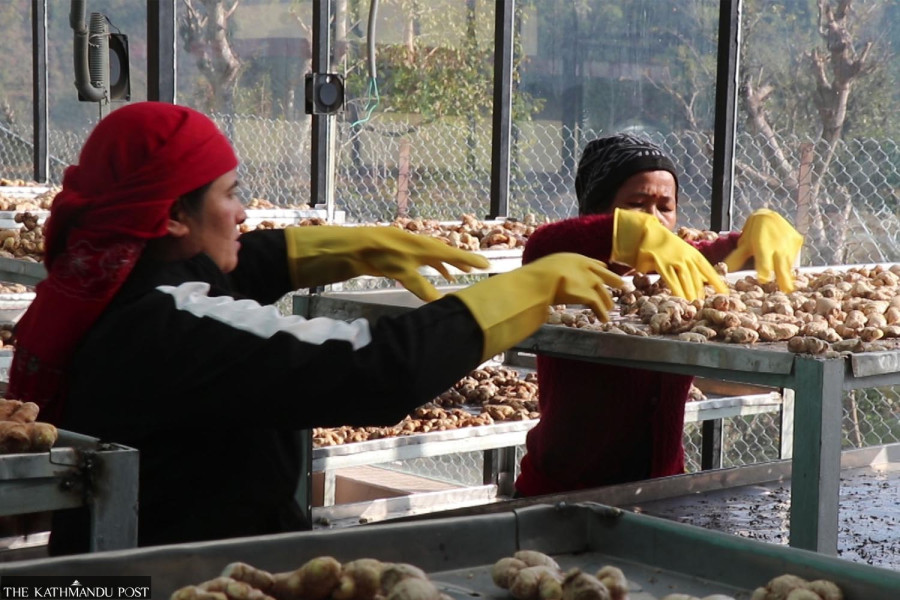Money
Ginger and beans from Palpa find European buyers
While dried ginger has been exported for two years, this season sees fresh ginger’s first shipment to the European market.
Madhav Aryal
Ginger and beans produced by farmers in Galda, Nisdi rural municipality, Palpa, have entered the European market.
While dried ginger has been exported for the past two years, this year marks fresh ginger's first shipment. The village is now preparing to export more dried ginger pieces and white beans.
Nine tonnes of organic-certified fresh ginger have already been exported to Europe.
Ammaya Mashrangi, manager of Galda Samaj Udhyami Mahila Sahakari Sanstha [women’s cooperatives] in Dhunganabesi, said that the cooperative aims to export 20 tonnes of fresh ginger this year.
The cooperative employs around 20 women daily to clean, cut, and dry the ginger.
Additionally, according to Narayani Dhungana, coordinator of the cooperative’s audit committee, 25 tonnes of white beans are being graded for export.
“We are so busy that we barely have time to talk,” Dhungana said.
A total of 272 farmers associated with the cooperative are involved in exporting certified organic ginger to Europe.
With support from relevant agencies, women in the village have been operating a ginger processing centre for the past four years. While dried ginger has been supplied to cities within Nepal and Europe for the last three years, the cooperative is now expanding its reach.
With financial aid from Heifer Nepal, coordination from the Rural Economic Development Association, Palpa, and technical support from aQysta Nepal Pvt Ltd, the cooperative planted “bose” ginger on 42 ropanis of leased land.
The ginger seeds were sourced from Sindhuli and Ramechhap.
Mashrangi said “bose” ginger is ideal for juice production. The cooperative has planted Bose ginger in Banglang, Gejha, Mudabhanjyang, Tamasgiri, and Bahapur, spending Rs100,300 on land leases.
Karmabati Sunari Magar of Dhunganabesi, who collects and grades white beans, shared her excitement about the European export opportunity.
“I have heard that the beans produced in our village will be exported to Europe,” said Magar, a Laligurans Women’s Group member. “If our production continues to reach European markets, it will be a great achievement.”
Due to traditional farming methods, the village’s beans have gained recognition in European markets. Farmers who previously earned Rs130-140 per kilogram of beans could sell them through the cooperative at Rs165 a kg.
Magar herself earned Rs110,000 by selling 669 kilograms of beans.
With market assurance, farmers are optimistic.
To meet European demand this year, the cooperative purchased 25 tonnes of white beans and three tonnes of black and grey beans, investing Rs4.56 million from a single village.
Among the collected beans, 20 tonnes will be exported to European countries such as Germany.
aQysta Nepal Pvt Ltd, an agricultural technical organisation, facilitates the export process.
“We are assisting with grading and other necessary preparations,” said Shrawan Kumar Shrestha, an agricultural technician. “Since this is a women-led cooperative, the work is progressing efficiently.”
Farmers cultivate beans in various villages, including Kathaidanda, Patangsar, Gejha, Dhanuwas, Gabudanda, Kharkadanda, Bahapur, Belauji, Dhachur, and Kotthar of Galda.
This year, aQysta Nepal signed an agreement to export 10 tonnes of dried ginger pieces of the “Nase” variety, equivalent to 60-65 tonnes of fresh ginger.
The cooperative exported four tonnes of ginger pieces to Europe in May last year. It had sent 805 kilograms of certified organic ginger as a sample two years ago.
Ashish Ghimire, an agriculture and crop science graduate who is another technician, supports the women in the cooperative.
To promote financial independence of women, they are being encouraged to cultivate cash crops such as ginger.
Only Galda is organic-certified, but efforts are being made to obtain certification for nearby villages, including Jyamire, Mityal, Jhirubas, and Sahalkot. Additionally, plans are in place to produce ginger powder.
Ginger produced in Nisdi has traditionally been supplied to Butwal, Bhairahawa, Kathmandu, and the southern neighbouring markets by traders.
The cooperative in Galda purchased 39 tonnes of ginger for Rs3.97 million and sold it for Rs4.76 million.
However, ginger cultivation has been declining due to a lack of attention from local, provincial, and central governments to ginger production, market expansion, and promotion.
Ginger is produced on 1,410 hectares in Palpa. The annual output is 15,581 tonnes.
The ginger grown in Nepal is high in oil and oleoresin, and it can be sold to large industrial buyers in India and other countries if output is increased and quality ensured, according to a study.




 13.12°C Kathmandu
13.12°C Kathmandu













